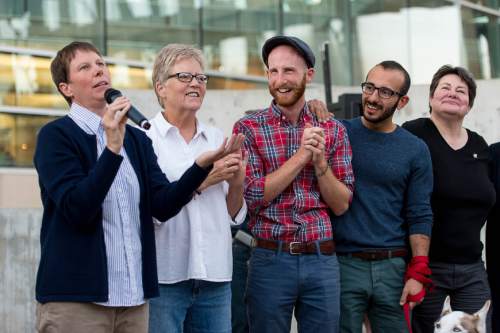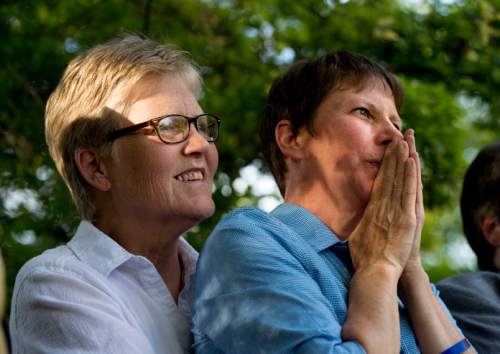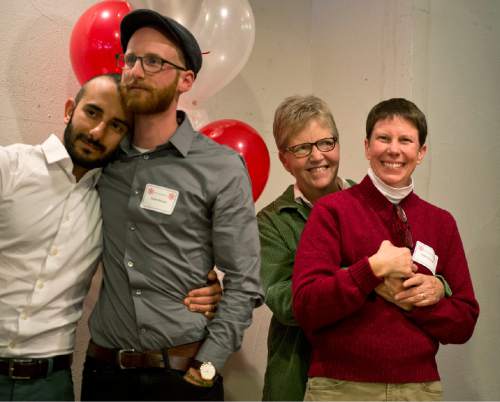This is an archived article that was published on sltrib.com in 2015, and information in the article may be outdated. It is provided only for personal research purposes and may not be reprinted.
The U.S. Supreme Court will decide whether same-sex couples have a right to marry everywhere in America under the Constitution — a potentially historic ruling that Utahns on both sides of the debate say they welcome.
Justices on Friday said they will take up gay-rights cases that ask them to overturn bans in four states — Kentucky, Michigan, Ohio and Tennessee — after a U.S. 6th Circuit Court of Appeals ruling in November consolidated the cases and upheld their respective bans on same-sex marriage, reversing the rulings of federal judges in all four states.
"We're thrilled," said Kody Partridge, one of six plaintiffs in the case that brought same-sex marriage to Utah in 2014. "There are so many lives in limbo when it is not settled law."
Gay marriage became legal in Utah in October, after the high court declined to hear the state's appeal of a federal judge's December 2013 decision that overturned a law barring the unions.
The Utah attorney general's office also applauded the justices' decision to tackle the issue.
"We are pleased that the Supreme Court of the United States has chosen to grant Certiorari, review briefs and hear arguments regarding a state's authority to define marriage and that this process will provide all citizens with clarity and resolution on an issue of such importance," the state said in a statement.
The justices will consider two related questions. The first is whether the Constitution requires states to issue marriage licenses to same-sex couples. The other is whether states must recognize same-sex marriages performed elsewhere.
Those are the same issues Utah raised — and lost — in its appeal to the 10th Circuit Court of Appeals in Denver last year.
It's not immediately clear whether Utah will opt to file a friend-of-the-court brief in the case, which justices will hear in April, but the state will consider it, said Parker Douglas, the state's federal solicitor.
If the high court rules to uphold the four states' bans on same-sex marriage, that decision would not immediately reverse court rulings that legalized the unions in Utah and elsewhere, although it could open the door to new lawsuits, Douglas added.
"There may be people in Utah and around the county who want to re-litigate those issues," Douglas said. "The 10th Circuit Court of Appeals opinion is settled; we're bound by that until the Supreme Court would tell the 10th Circuit otherwise."
A court decision affirming the bans would leave the existing patchwork of differing marriage laws in place nationwide, but that's not likely to happen, said Cliff Rosky, a University of Utah law professor and an expert in marriage law.
"The equal-protection clause can't mean one thing in Ohio and another thing in Utah," said Rosky, chairman of the board for the LGBT advocacy group Equality Utah "That doesn't work."
That justices have decided to hear the 6th Circuit cases is no surprise, Rosky said. The rulings there are the first to contradict other circuit-court rulings, and it's the Supreme Court's job to settle disputes. And there should be no doubt that justices will ultimately legalize marriage equality nationwide, he said.
"We know how this case is going to come out," Rosky said. "They tipped their hand in October by giving a green light to tens of thousands of new marriages. … [The court] is not going to take that back."
Gay marriage is legal in 36 states and the District of Columbia. That number has more than doubled since the 2013 ruling from Utah's U.S. District Judge Robert Shelby, which said the protections of the 14th Amendment and due process related to marriage should apply to all.
Shelby's decision was the first to come after the U.S. Supreme Court struck down the federal Defense of Marriage Act in 2013 and became a road map that would be cited by other judges in other states.
For her part, Partridge said, she and her wife, Laurie Wood, will be glad to have the Supreme Court hear the issue argued and added they believe all points of view have a right to be heard.
"The justice system is working," she said. "I have said from the beginning that I do believe the world spins forward. We have so many judges who have listened to the merits ... and have started to say, 'Consenting adults should have the right to marry.' ''
The Associated Press contributed to this report.







